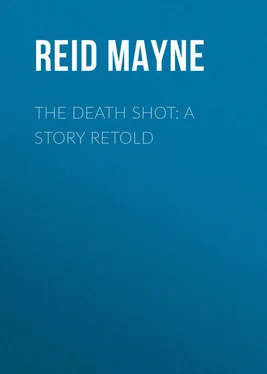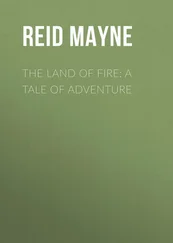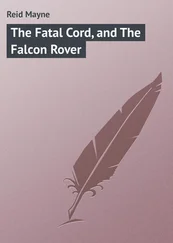Mayne Reid - The Death Shot - A Story Retold
Здесь есть возможность читать онлайн «Mayne Reid - The Death Shot - A Story Retold» — ознакомительный отрывок электронной книги совершенно бесплатно, а после прочтения отрывка купить полную версию. В некоторых случаях можно слушать аудио, скачать через торрент в формате fb2 и присутствует краткое содержание. Жанр: literature_19, foreign_antique, foreign_prose, на английском языке. Описание произведения, (предисловие) а так же отзывы посетителей доступны на портале библиотеки ЛибКат.
- Название:The Death Shot: A Story Retold
- Автор:
- Жанр:
- Год:неизвестен
- ISBN:нет данных
- Рейтинг книги:3 / 5. Голосов: 1
-
Избранное:Добавить в избранное
- Отзывы:
-
Ваша оценка:
- 60
- 1
- 2
- 3
- 4
- 5
The Death Shot: A Story Retold: краткое содержание, описание и аннотация
Предлагаем к чтению аннотацию, описание, краткое содержание или предисловие (зависит от того, что написал сам автор книги «The Death Shot: A Story Retold»). Если вы не нашли необходимую информацию о книге — напишите в комментариях, мы постараемся отыскать её.
The Death Shot: A Story Retold — читать онлайн ознакомительный отрывок
Ниже представлен текст книги, разбитый по страницам. Система сохранения места последней прочитанной страницы, позволяет с удобством читать онлайн бесплатно книгу «The Death Shot: A Story Retold», без необходимости каждый раз заново искать на чём Вы остановились. Поставьте закладку, и сможете в любой момент перейти на страницу, на которой закончили чтение.
Интервал:
Закладка:
The girl has not far to go – only half a mile or so, from the house, and less than a quarter beyond the zigzag rail fence, which forms a boundary line between the maize fields and primeval forest. Her journey, when completed, will bring her under a tree – a grand magnolia, monarch of the forest surrounding. Well does she know it, as the way thither.
Arriving at the tree, she pauses beneath its far-stretching boughs. At the same time tossing back her hood, she shows her face unveiled.
She has no fear now. The place is beyond the range of night-strolling negroes. Only one in pursuit of ’possum, or ’coon, would be likely to come that way; a contingency too rare to give her uneasiness.
With features set in expectation, she stands. The fire-flies illuminate her countenance – deserving a better light. But seen, even under their pale fitful coruscation, its beauty is beyond question. Her features of gipsy cast – to which the cloak’s hood adds characteristic expression – produce a picture appropriate to its framing – the forest.
Only for a few short moments does she remain motionless. Just long enough to get back her breath, spent by some exertion in making her way through the wood – more difficult in the darkness. Strong emotions, too, contribute to the pulsations of her heart.
She does not wait for them to be stilled. Facing towards the tree, and standing on tiptoe, she raises her hand aloft, and commences groping against the trunk. The fire-flies flicker over her snow-white fingers, as these stray along the bark, at length resting upon the edge of a dark disc – the knot-hole in the tree.
Into this her hand is plunged; then drawn out – empty!
At first there is no appearance of disappointment. On the contrary, the phosphoric gleam dimly disclosing her features, rather shows satisfaction – still further evinced by the phrase falling from her lips, with the tone of its utterance. She says, contentedly: – “ He has got it !”
But by the same fitful light, soon after is perceived a change – the slightest expression of chagrin, as she adds, in murmured interrogatory, “Why hasn’t he left an answer?”
Is she sure he has not? No. But she soon will be.
With this determination, she again faces towards the tree; once more inserts her slender fingers; plunges in her white hand up to the wrist – to the elbow; gropes the cavity all round; then draws out again, this time with an exclamation which tells of something more than disappointment. It is discontent – almost anger. So too a speech succeeding, thus: —
“He might at least have let me know, whether he was coming or not – a word to say, I might expect him. He should have been here before me. It’s the hour – past it!”
She is not certain – only guessing. She may be mistaken about the time – perhaps wronging the man. She draws the watch from her waistbelt, and holds the dial up. By the moon, just risen, she can read it. Reflecting the rays, the watch crystal, the gold rings on her fingers, and the jewels gleam joyfully. But there is no joy on her countenance. On the contrary, a mixed expression of sadness and chagrin. For the hands indicate ten minutes after the hour of appointment.
There can be no mistake about the time – she herself fixed it. And none in the timepiece. Her watch is not a cheap one. No fabric of Germany, or Geneva; no pedlar’s thing from Yankeeland, which as a Southron she would despise; but an article of solid English manufacture, sun-sure , like the machine-made watches of “Streeter.”
In confidence she consults it; saying vexatiously:
“Ten minutes after, and he not here! No answer to my note! He must have received it: Surely Jule put it into the tree? Who but he could have taken it out? Oh, this is cruel! He comes not – I shall go home.”
The cloak is once more closed, the hood drawn over her head. Still she lingers – lingers, and listens.
No footstep – no sound to break the solemn stillness – only the chirrup of tree-crickets, and the shrieking of owls.
She takes a last look at the dial, sadly, despairingly. The hands indicate full fifteen minutes after the hour she had named – going on to twenty.
She restores the watch to its place, beneath her belt, her demeanour assuming a sudden change. Some chagrin still, but no sign of sadness. This is replaced by an air of determination, fixed and stern. The moon’s light, with that of the fire-flies, have both a response in flashes brighter than either – sparks from the eyes of an angry woman. For Helen Armstrong is this, now.
Drawing her cloak closer around, she commences moving off from the tree.
She is not got beyond the canopy of its branches, ere her steps are stayed. A rustling among the dead leaves – a swishing against those that live – a footstep with tread solid and heavy – the footfall of a man!
A figure is seen approaching; as yet only indistinctly, but surely that of a man. As surely the man expected?
“He’s been detained – no doubt by some good cause,” she reflects, her spite and sadness departing as he draws near.
They are gone, before he can get to her side. But woman-like, she resolves to make a grace of forgiveness, and begins by upbraiding him.
“So you’re here at last. A wonder you condescended coming at all! There’s an old adage ‘Better late than never.’ Perhaps, you think it befits present time and company? And, perhaps, you may be mistaken. Indeed you are, so far as I’m concerned. I’ve been here long enough, and won’t be any longer. Good-night, sir! Good-night!”
Her speech is taunting in tone, and bitter in sense. She intends it to be both – only in seeming. But to still further impress a lesson on the lover who has slighted her, she draws closer the mantle, and makes as if moving away.
Mistaking her pretence for earnest, the man flings himself across her path – intercepting her. Despite the darkness she can see that his arms are in the air, and stretched towards her, as if appealingly. The attitude speaks apology, regret, contrition – everything to make her relent.
She relents; is ready to fling herself upon his breast, and there lie lovingly, forgivingly.
But again woman-like, not without a last word of reproach, to make more esteemed her concession, she says: —
“’Tis cruel thus to have tried me. Charles! Charles! why have you done it?”
As she utters the interrogatory a cloud comes over her countenance, quicker than ever shadow over sun. Its cause – the countenance of him standing vis-à-vis . A change in their relative positions has brought his face full under the moonlight. He is not the man she intended meeting!
Who he really is can be gathered from his rejoinder: —
“You are mistaken, Miss Armstrong. My name is not Charles, but Richard. I am Richard Darke .”
Chapter Twelve.
The wrong man
Richard Darke instead of Charles Clancy!
Disappointment were far too weak a word to express the pang that shoots through the heart of Helen Armstrong, on discovering the mistake she has made. It is bitter vexation, commingled with a sense of shame. I or her speeches, in feigned reproach, have terribly compromised her.
She does not drop to the earth, nor show any sign of it. She is not a woman of the weak fainting sort. No cry comes from her lips – nothing to betray surprise, or even the most ordinary emotion.
As Darke stands before her with arms upraised, she simply says, —
“Well, sir; if you are Richard Darke, what then? Your being so matters not to me; and certainly gives you no right thus to intrude upon me. I wish to be alone, and must beg of you to leave me so.”
The cool firm tone causes him to quail. He had hoped that the surprise of his unexpected appearance – coupled with his knowledge of her clandestine appointment – would do something to subdue, perhaps make her submissive.
Читать дальшеИнтервал:
Закладка:
Похожие книги на «The Death Shot: A Story Retold»
Представляем Вашему вниманию похожие книги на «The Death Shot: A Story Retold» списком для выбора. Мы отобрали схожую по названию и смыслу литературу в надежде предоставить читателям больше вариантов отыскать новые, интересные, ещё непрочитанные произведения.
Обсуждение, отзывы о книге «The Death Shot: A Story Retold» и просто собственные мнения читателей. Оставьте ваши комментарии, напишите, что Вы думаете о произведении, его смысле или главных героях. Укажите что конкретно понравилось, а что нет, и почему Вы так считаете.












